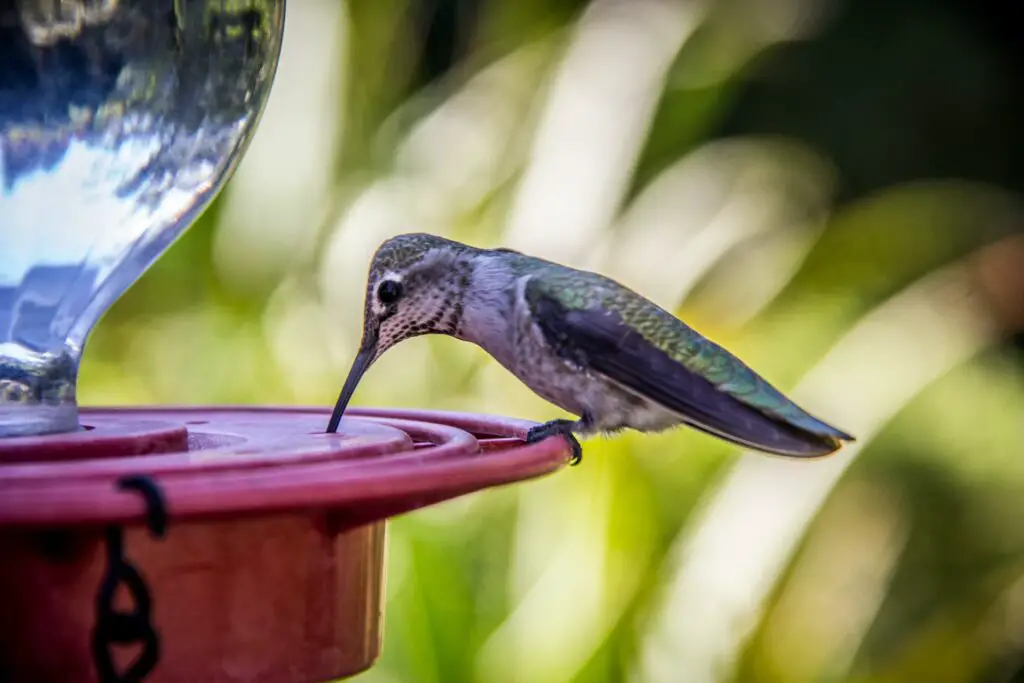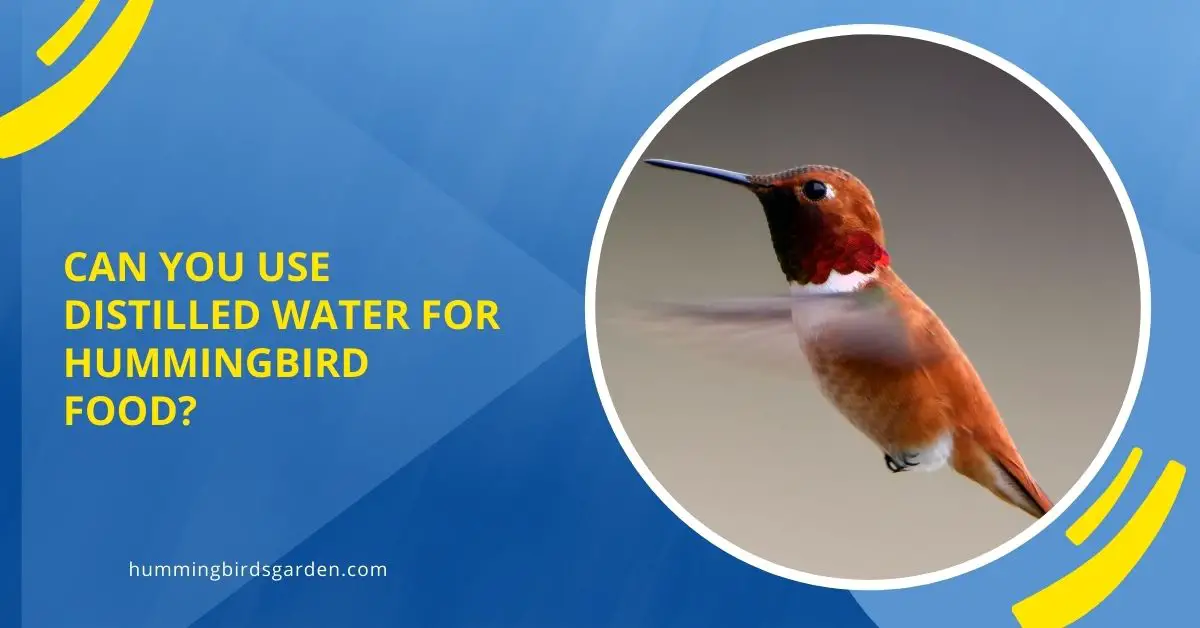If you’re a bird enthusiast or have a hummingbird feeder in your garden, you might have wondered about the best type of water to use for hummingbird food.
Distilled water is a popular choice for many, but is it the right choice for your feathered friends? In this article, we will discuss the pros and cons of using distilled water for hummingbird food, along with alternative options and helpful tips to keep your hummingbirds happy and healthy.
While distilled water is indeed a safe option for hummingbird food, it may not be the most beneficial choice.
In this short answer, tap water or spring water can provide the necessary minerals that distilled water lacks, ensuring the health of your visiting hummingbirds. So, let’s dive into the world of hummingbird care and explore the best ways to create nutritious food for these captivating creatures.
Understanding Hummingbird Food Requirements
The Importance of Nectar
Hummingbirds primarily rely on nectar as their main food source. Nectar provides the essential sugars needed to fuel their high-energy lifestyle, as these tiny birds have incredibly fast metabolism rates. While they also feed on insects and spiders for protein, nectar remains a vital component of their diet.
Nutrients and Minerals for Hummingbirds
In addition to sugar, hummingbirds require various nutrients and minerals for optimal health. These include calcium, sodium, potassium, and other trace minerals that can be found in natural water sources. The type of water you use for hummingbird food plays a significant role in providing these essential elements.
Distilled Water for Hummingbird Food: Pros and Cons
Advantages of Distilled Water
Distilled water is purified through a process that removes impurities, making it free from contaminants such as bacteria, parasites, and chemicals. This is particularly beneficial if the tap water in your area is known to be of poor quality or contains high levels of contaminants.
Disadvantages of Distilled Water
While distilled water is a safe option for hummingbird food, it lacks the minerals that hummingbirds need for optimal health. Since the distillation process removes these minerals, using distilled water in your hummingbird feeder may not provide the most nourishing food source for your visiting birds.

Alternatives to Distilled Water
Tap Water: An Easy Choice
If your tap water is of good quality and free from contaminants, it can be a suitable option for hummingbird food. Tap water contains minerals that are beneficial to hummingbirds and is also a convenient and cost-effective choice.
Spring Water: A Natural Option
Spring water is collected from natural sources and contains essential minerals, making it an excellent choice for hummingbird food. However, ensure that the spring water you use is free from contaminants and has not been treated with chemicals.
Rainwater: A Sustainable Solution
Collecting and using rainwater for your hummingbird feeder is an eco-friendly and sustainable option. Rainwater contains necessary minerals and is free of added chemicals. However, it’s essential to ensure that the collected rainwater is clean and free from debris or contaminants.
Homemade Hummingbird Nectar Recipe
Creating your own hummingbird nectar is a simple and cost-effective way to provide food for your feathered visitors. Here’s a quick and easy recipe:
- Combine 1 part granulated white sugar with 4 parts water.
- Stir the mixture until the sugar is completely dissolved.
- Store any unused nectar in the refrigerator for up to two weeks.
Remember, there’s no need to add food coloring or artificial sweeteners, as these can be harmful to hummingbirds.
Tips for Maintaining a Healthy Hummingbird Feeder
Cleaning Your Feeder
Clean your hummingbird feeder regularly to prevent mold and bacterial growth. Use a solution of warm water and white vinegar or mild soap to scrub the feeder, then rinse thoroughly before refilling.
Proper Feeder Placement
Place your hummingbird feeder in a shaded area to prevent the nectar from spoiling quickly. Ensure that it is at least 5 feet above the ground and away from potential predators like cats.
Frequently Asked Questions
- How often should I change the nectar in my hummingbird feeder? Change the nectar in your feeder every 2-3 days during hot weather and every 5-7 days during cooler temperatures.
- Can I use honey, brown sugar, or artificial sweeteners in my hummingbird food? No, these substances can be harmful to hummingbirds. Only use granulated white sugar for homemade hummingbird nectar.
- Why are my hummingbirds not visiting my feeder? Several factors can deter hummingbirds, such as competition from other birds, poor feeder placement, or unappealing nectar. Ensure your feeder is clean, well-stocked, and in a suitable location.
- Should I take my hummingbird feeder down in the winter? If you live in an area with year-round hummingbird populations, keep your feeder up throughout the winter. In colder regions, take your feeder down when hummingbirds migrate south.
- Do hummingbirds need water for drinking and bathing? Yes, hummingbirds need water for drinking and bathing. Provide a shallow dish or birdbath with clean water for them to enjoy.
Conclusion
In summary, while distilled water is a safe option for hummingbird food, it may not provide the necessary minerals for optimal hummingbird health. Consider using tap water, spring water, or rainwater as alternatives, ensuring that the water is clean and free from contaminants.
With proper feeder maintenance and the right type of water, you can create a welcoming environment for these beautiful birds to thrive.
















I’ve been using distilled water to make hummingbird nectar for over 6 months now and haven’t noticed anything bad happening to the birds as a result. I didn’t realize until reading this article that it might be a problem. I just began adding trace mineral drops to my distilled water and I am wondering if that is OK to use for the hummingbirds, too…?
I really don’t want to use the tap water for the hummingbirds because it tastes horrible. I can’t even get it down anymore.
Adding trace mineral drops to distilled water for hummingbirds is generally considered safe, as long as you are using a product specifically designed for birds or one with no harmful additives. Trace minerals can help replace essential nutrients that may be missing from distilled water.
However, it is more important to provide hummingbirds with a sugar-water mixture, as their primary source of energy comes from nectar.
While trace minerals can be beneficial, the primary focus should be on providing an appropriate sugar-water mixture for the hummingbirds to ensure they get the energy they need.
I would think that only untreated/ un softened tap water, derived from home well-water systems, would be ok, since municipal water supplies are chlorinated, and may also contains fluoride.